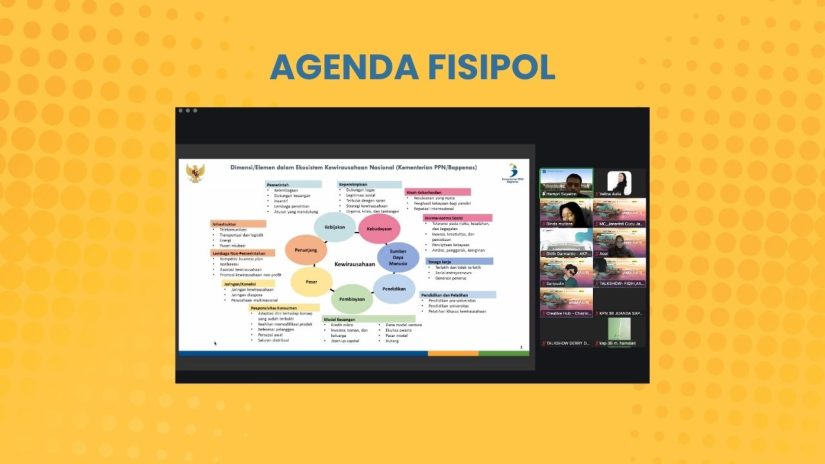
Two lecturers from the Faculty of Social and Political Sciences (FISIPOL), Universitas Gadjah Mada, Massageng Widagdhaprasana and Hempri Suyatna, joined as speakers at the online Townhall Muda Yogyakarta forum under the theme “Youth Entrepreneurship Innovation.” On this occasion, both highlighted opportunities, challenges, and innovations in developing a sustainable social entrepreneurship ecosystem.
Director of the Creative Hub (C-Hub) FISIPOL UGM, Massageng Widagdhaprasana, emphasized that FISIPOL’s role through C-Hub is not merely as an incubator but also as a catalyst in building a youth entrepreneurship ecosystem. “We aim to establish a transdisciplinary learning ecosystem that generates new values in social entrepreneurship. Young people must be encouraged to adapt through various cross-sector collaborations,” he explained.
He further noted that social entrepreneurship needs to balance profit and social values so that sustainability can be achieved with broader impact. Creative economy, food security, and incubation are among the main focuses continuously developed with partners.
Meanwhile, in a separate session, Hempri Suyatna underscored the strategic role of universities in fostering entrepreneurship among students. According to him, higher education institutions serve as sources of innovation that emerge from students, supported by real contributions such as training, mentoring, and entrepreneurial development spaces. “Entrepreneurship curriculum alone is not sufficient. Universities need to provide concrete support so students can truly develop sustainable businesses,” he stressed.
He also criticized the condition of MSMEs in Indonesia, which often struggle to scale up because many are established by accident rather than by design. In fact, MSMEs have the potential to act as a safeguard for the national economy. “Unfortunately, most micro-enterprises are not properly designed. We need to push entrepreneurship to become an essential driver for developing MSMEs that are able to grow and move up the ladder,” Hempri added.
Through this forum, FISIPOL UGM seeks to strengthen the role of youth as key actors in regional development. With social innovation, inclusive entrepreneurial networks, and tangible support from universities, young people are expected to become agents of change toward a competitive and equitable economy.
The insights and contributions delivered by the two FISIPOL UGM lecturers are aligned with the Sustainable Development Goals (SDGs). By strengthening youth capacity and fostering multi-stakeholder collaboration, this forum supports the achievement of SDG 4 (Quality Education) through entrepreneurship education in universities, SDG 8 (Decent Work and Economic Growth) by helping MSMEs and social enterprises scale up, SDG 9 (Industry, Innovation, and Infrastructure) through the development of innovative ecosystems, and SDG 17 (Partnerships for the Goals) by building collaborative cross-sector partnerships.
